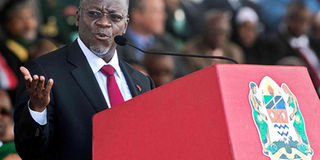Tanzania now seems ripe for fresh engagement with Kenya

Tanzanian President John Magufuli. While Kenya still sells more to Tanzania than vice versa, the gap has been narrowing. PHOTO | DANIEL HAYDUK | AFP
What you need to know:
- Today, Tanzania is the fourth-largest African source of imports into Kenya after South Africa, Egypt and Uganda.
- I think the opportunity is right for the two countries to redefine the rules of engagement and find areas of co-operation and mutual benefit.
Tanzania has come a long way in the past 15 years. Dar es Salaam is a bustling, prosperous city with much improved infrastructure; it’s bus system is definitely much better than anything Nairobi has to offer.
The people are also a lot more assertive — still polite but confident and not too worried about being in your face.
Service is miles ahead of what it used to be — more efficient and quicker.
Dar’s new skyscrapers are certainly a statement of intent, that it intends to contend with the other regional capitals for a place at the head of the table and claim its fair share of business and investment.
Politics and government are also different. Tanzania, as ever, is strongly governed with CCM still firmly in the saddle and driven by nationalism and a strong desire to be self-reliant.
The government is unlike any in the recent past: It is popular, populist and quite no-nonsense.
LIBERTY
A lot has been made about civil liberties in Tanzania — and that’s a big issue with the arrest of some opposition leaders and another one shot in the streets in a strange, yet-to-be-solved crime.
The state of civil liberties in the region — from Ethiopia, Uganda to Rwanda — actually leaves a lot to be desired.
But were Tanzania, the land of Mwalimu Julius Nyerere, to transform from a country of passionate debates and stimulating, eloquent and outspoken disputation to one where folks hold their tongues and are guarded in their opinion, it would be tragic.
But while Tanzania has evolved in whatever direction, its issues with Kenya stubbornly remain the same: Complaints by hordes of Kenyans about work permits and a quiet determination by Dar to keep the jobs and national resources from its northern neighbours.
I do not know whether the two capitals put a lot of store in the integration agenda anymore.
EAC
It would be smart to open up the economies and build a bigger, more attractive market and production base.
True, that comes with the danger of putting some parts of the region at a disadvantage.
Tanzanians are a lot more aggressive but I am not sure they can see off an onslaught by job-hungry Kenyans. And it is not a good thing to be rendered jobless in your country by a neighbour.
Some in East Africa have probably not given up on the dream of closer co-operation, but they certainly put the whole idea into cold storage to await better times, when the chemistry is better.
However, Tanzania’s dependence on the Kenyan market has been growing over the years.
While Kenya still sells more to Tanzania than vice versa, the gap has been narrowing.
TRADE
In the first 10 months of 2017, for example, the value of Kenyan exports to Tanzania dropped 19 percent to Sh23 billion while that of Tanzanian exports to Kenya increased 25 percent to Sh13 billion.
Today, Tanzania is the fourth-largest African source of imports into Kenya after South Africa, Egypt and Uganda.
Trade being reciprocal, Tanzania may well discover sooner rather than later that, being a vibrant, productive economy, it has lot more to protect than just jobs and land.
Anecdotally, I think a lot fewer Kenyans work in Tanzania than in the past and the country has enthusiastically hired from the rest of Africa.
Kenya’s big fear of costing its citizens jobs in Tanzania or risking investments across the border, I am willing to guess, will be all but gone in 10 years.
I think the opportunity is right for the two countries to redefine the rules of engagement and find areas of co-operation and mutual benefit such as the preservation and mutually beneficial exploitation of natural resources, including tourist attractions.
The failure to negotiate a comfortable situation where an exchange of capital and skills could generate wealth and lift the people out of poverty is really a shame, but such is life.
* * *
The new theatre of corruption is the theft of land — private land.
Civil servants, the security sector thugs and corrupt Judiciary officials are working in cahoots with crooks to steal private land.
I know I have written about this before and I do not have the space to fully explore it, but billions of shillings are being stolen from Kenyans.
The thugs, with the protection of police, elements in the provincial administration and Lands officials, forge ownership documents, invade and evict rightful owners, but police sit on their hands and tell the victims to go to court, where corrupt judicial officials do the rest: They recognise the right of the invader to stay in the land and sit on the case forever before ruling in favour of the invader, quite probably.
IMPUNITY
It’s not difficult. If you have a gun, you hang out with governors, can claim to be the President’s personal friend and you have the protection of a judge and a police boss, you can take people’s property with impunity. I suspect some politicians are in this game.
This is very dangerous. If police and the courts aid and abet criminals in this way, people will lose confidence in the State, resort to violence and the credibility and viability of the State will be in grave jeopardy.
My advice to the authorities is to crack down on land thieves and networks, come down on them harder than you have on the importers of crazy stuff.





